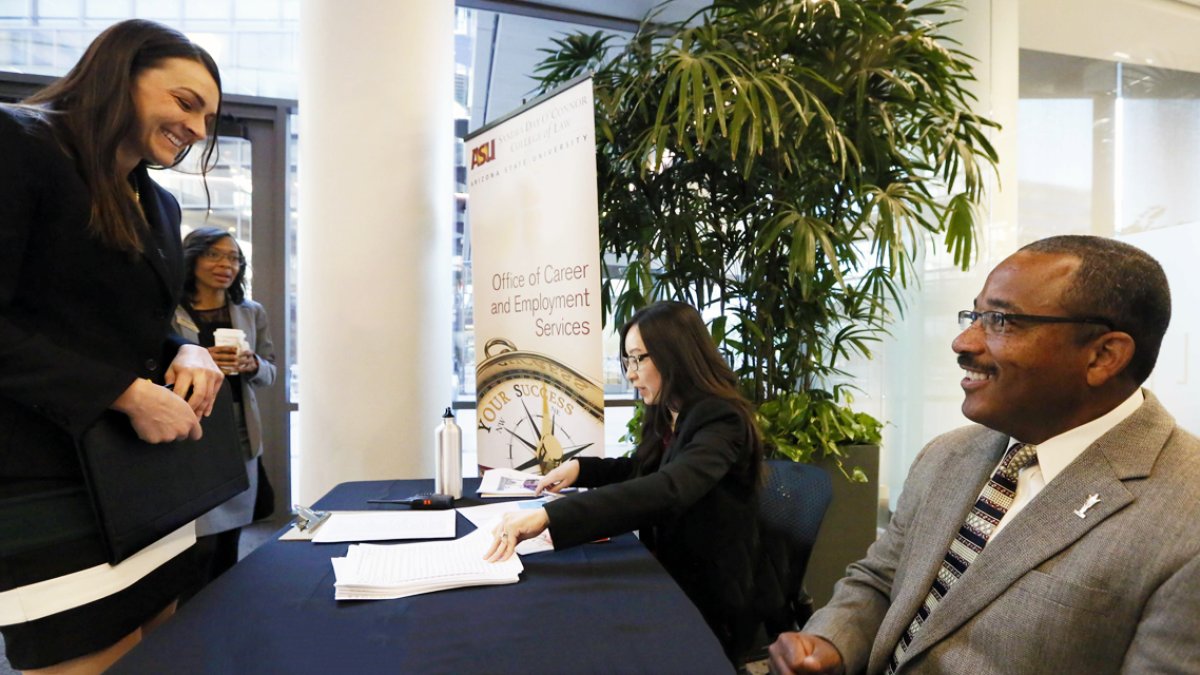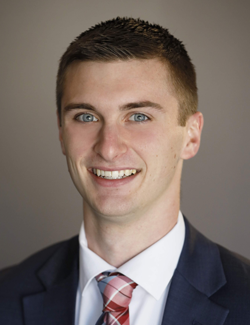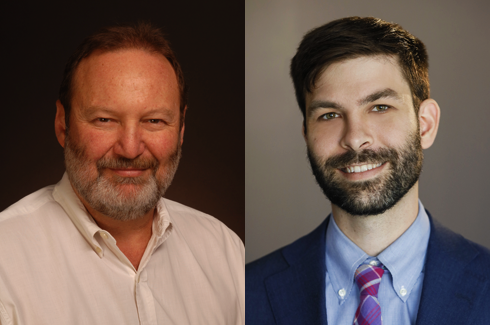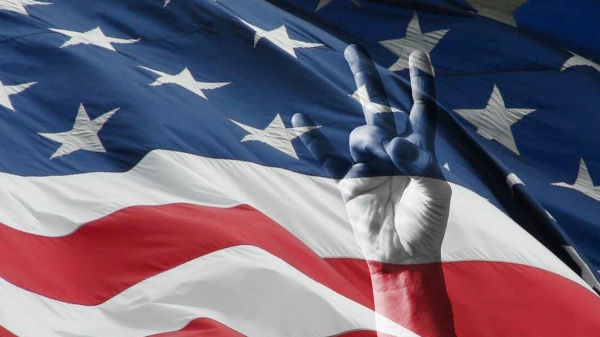ASU Law innovates to find purpose-driven positions for students as global crisis disrupts summer job market

Assistant Dean Ray English, who oversees ASU Law’s Office of Career and Employment Services, greets students during on-campus interviews in 2018.
For law students, summer internships and externships are of vital importance, offering the chance for real-world training and network building that can lay the foundation for a successful career. Many students had positions lined up or were in the process of doing so when the COVID-19 pandemic suddenly threw the world into turmoil, sweeping away prized opportunities.
Looking at a small army of talented students in need of work, and a local community facing a multitude of dire needs, the Sandra Day O’Connor College of Law at Arizona State University saw challenges – but also opportunities.
So Dean Douglas Sylvester asked the ASU Law faculty and staff to do what ASU does best: innovate. Figure out how to employ the students, internally or externally, in meaningful ways that not only provide experiential learning opportunities, but help advance ASU’s mission of serving the greater good in perhaps the local community’s greatest moment of need.
“Our students, like so many people throughout the world, were thrown into an unprecedented situation,” Sylvester said. “We always say that we will be there for our students at all times, but that’s especially important in the most challenging times. Our goal was to accommodate every student in need of a position this summer, and I am proud to say that we met that goal.”
Assistant Dean Ray English, who oversees ASU Law’s Office of Career and Employment Services, says in short order, projects were expanded, jobs were created and, ultimately 94 students submitted 445 applications. And every student secured work.
Moving quickly
The pandemic unfolded quickly in March, as a once-distant threat swept through the United States, affecting everything in its path. And the impact rapidly expanded, affecting businesses and nonprofits, law firms and government agencies, the private sector and the public sector. Jobs of all types vanished, including externships and internships. It was a fast-moving crisis that required a nimble response.
“Part of our role is to anticipate changes in the job market,” English said. “So when this all started happening, my team got together and we realized there was a strong possibility that students would be impacted. We immediately started developing a plan after speaking with different organizations and professors who could create experiential learning opportunities for ASU Law students. When we started seeing jobs getting canceled, we activated that plan and executed it. The dean said we want to be able to say ‘yes’ to everybody. And that’s exactly what happened: We were able to say ‘yes’ to every one of our students.”

Caleb Morey, an incoming 2L student at the Sandra Day O’Connor College of Law.
One of those students was Caleb Morey, who just completed his first year at ASU Law.
He had applied with a number of big firms over winter break, but was unable to land a summer position. He was waiting for some of the smaller firms to post positions in March when the pandemic came along. He was aggressively searching but not finding any opportunities, so he turned to ASU Law’s Office of Career and Employment Services.
“I asked them, ‘Can you point me in the right direction? Who should I be contacting?’ From there, we set up a meeting,” he said. “They told me to send them my resume. I did, and about an hour later, the Beus Gilbert McGroder law firm had called career services and wanted me to start on Monday.”
Morey had gone home to Indiana when the pandemic hit, and after a month and a half, decided to come back to Phoenix to check on his apartment. Exhausted after the late-night flight, he had his meeting with career services, then took a nap. When he woke up, the job offer was waiting for him.
“That was just a whirlwind of a day,” he said. “But it was awesome.”
He recommends ASU Law’s career services team as a powerful resource that can help students tap into the law school’s vast network of alumni and local legal professionals. And he couldn’t be happier about where he landed for the summer, working for the namesake of ASU Law’s building, the Beus Center for Law and Society in downtown Phoenix. In fact, he’s glad his initial job-seeking efforts didn’t pan out.
“I’m having a great experience, and I feel like it was meant to be,” Morey said. “With the work that Mr. Beus has done for Arizona State University, it’s such a great opportunity. Their firm is so renowned for the work they’ve done, and it’s just a blessing to be able to learn from — and be involved with — these individuals that give so much back to ASU.”
Creating jobs
ASU Law looked internally to line up work for its students. And perhaps the best place to start was the Arizona Legal Center. The independent nonprofit center has been housed at the Beus Center since it was established in 2016. Designed to help underserved communities with free legal consultations, the center gets about 100 calls a week during typical times.

Victoria Ames is the president and managing partner of the Arizona Legal Center and assistant dean of legal projects and external engagement at ASU Law.
But once the pandemic arrived, the center was inundated with requests for help. Victoria Ames, the president and managing partner of the center and assistant dean of legal projects and external engagement at ASU Law, said the volume of calls spiked to nearly 500 per week during the peak demand. Although that volume has receded to about 300 per week, it’s still considerably more than usual.
“When the pandemic first started, our staff was enormously stretched right away, because the phones were just exploding,” Ames said. “For the first month, we were working all day, every day. Then when students started losing summer positions, Dean Sylvester asked if the ALC would be willing to accommodate some of those students. We thought we’d take 5 to 10 extra students, and that turned into 20, then 25 and now it’s over 30, so we’ve got quite a robust team. But the good work they’re going to do this summer is going to be really impactful to the community, and hopefully they’ll have wonderful memories and great experiences with us.”
Ames said the original plans for the summer called for just nine student volunteers. But Ames says there is plenty of work to go around. The students will be on the front lines of providing general legal information to the community, by helping develop and present know-your-rights forums. Additionally, they will be working with multiple municipalities and offices as they field calls from the COVID-19 hotline that the state bar and the governor’s office recently launched. They also will gain real-world experience by helping provide actual legal representation, a new low-cost service being offered by the center, under Rule 38, which allows students under direct supervision to be admitted to the state bar on a limited-scope basis.
Ames says being able to now offer representation is an enormous benefit to those calling for help.
“It used to be that people would call us and we’d give them advice but we couldn’t do much else other than guide them on their way to do things on their own,” she said. “But now, at a very reduced price just to cover our expenses, we are offering limited-scope representation, document preparation, demand letters and other things to help our callers who couldn’t otherwise afford the $300 to $400 hourly rate in the market.”
More legal assistance
The Arizona Legal Center already existed as a resource to help address community legal needs during the pandemic. Professor Robert Dauber and Tim Myers, a visiting clinical fellow at ASU Law, want to create more.

Professor Robert Dauber (left) and Timothy Myers, a visiting clinical fellow at ASU Law.
The two are spearheading a project that has its roots in previous work Myers did in Chicago in 2016.
“At that time, there was a lot of talk about potential changes in immigration law,” Myers said. “I was centered in high schools on the west and south sides of Chicago, and this created a lot of questions and a crisis in the immigration community. People were wondering what they were going to do if changes were made with DACA and other issues. And an idea I had was to respond to this need by creating educational programming for students and their families to address these large changes and make sure that families could feel more comfortable during this time of crisis and help them create safety plans in case something happens.”
Taking the lessons learned from that experience, Myers and Dauber want to form a similar response to the COVID-19 crisis, employing students as research assistants to educate the public about legal issues related to the pandemic. They plan to create presentations on some of the broad topics within that scope, such as labor and employment, small businesses, housing and family issues.
“First, the students will be reaching out to community partners to identify exactly what information would be most helpful,” Dauber said. “What are the needs? We don’t want to predetermine those topics before they start doing their needs assessment.”
A team of nine student research assistants will work on the project. Four teams of two will address a specific topic, assessing community legal questions and creating an informational product that will explain opportunities and obligations in regard to specific statutes. For instance, small businesses may be wondering whether they are required to have employees or customers wear face masks. Another student will help create the platform for the delivery of the information.
“We’re really trying to fill a need here,” Myers said. “There are a lot of great legal organizations putting out educational resources. But a lot of those materials are tailored for attorneys, to help them in representing their clients. We want to be a direct source to the clients themselves, to the community — and going to the community first and seeing what their needs are so that we’re answering the questions that they actually have.”
And Dauber says the project touches on a more chronic need.
“The students will be involved in figuring out how to provide legal information to the public, which I think is a big gap right now,” he said. “We’d love to have our students involved in educating the public about their legal rights and obligations, generally.”
Accelerating interdisciplinary efforts
While the pandemic remains a pressing issue, faculty members throughout ASU Law will be collaborating with students over the summer on a wide variety of projects.

Trevor Reed is an associate professor in ASU Law’s Indian Legal Program.
Trevor Reed, an associate professor in ASU Law’s Indian Legal Program, was originally planning to have one or two students working with him on Native American intellectual property initiatives. When asked if he could take on more, he said, “I can take as many as you need.”
He now has a team of 10 students.
“Over the last several months, I have received calls from tribal members on reservations here locally, asking about how to protect the work that they have been creating,” Reed said. "Artists, entrepreneurs, one of them wanting to get their art to the market, another was starting up a new enterprise. They had questions about how to get their copyrights registered, how to get their trademarks registered. So we thought we should put together an online resource that tribal members can use to help them protect the things they are creating.”
He said a number of tribes have also reached out, looking for help strategizing about how to protect cultural property, including cultural resources in the path of border-wall construction.
When ASU Law put out a call for students looking to help out, he was thrilled by the response.
“Students told me they responded because they simply wanted to help out Native communities,” he said. “I was excited by their motivation — a willingness to jump on board and help out in an area of law which most had little exposure to.”
The increased staffing, which has brought an interdisciplinary element to Reed’s work, also helps provide a diversity of thoughts and perspectives.
Diana Bowman, the associate dean for international engagement at ASU Law, is deeply involved in an interdisciplinary effort as well. She is co-director of the Center for Smart Cities and Regions and serves as ASU’s lead on The Connective, a collaboration of ASU, the Maricopa Association of Governments, the Greater Phoenix Economic Council, the Institute for Digital Progress and the Partnership for Economic Innovation.
And like Reed, her student team has been greatly expanded for the summer: from zero students to 14.

Diana Bowman is the associate dean for international engagement at ASU Law.
“Dean Sylvester put out a call to faculty to think creatively about how we could give students phenomenal summer experiences, whether that was in the more traditional kind of research area or coming into more of a clinical environment,” Bowman said. “Over the last two years, I’ve been working to create The Connective and the smart region. So rather than my more traditional academic work, I thought there was an opportunity to bring students into that program of work. Which is far more practically oriented in a way to help think about things such as the governance framework of the smart region, thinking about procurement. Which is a real challenge to our cities and towns: How can they procure at scale to get better value?”
The students will be working under the umbrella of The Connective and other prominent organizations, which will benefit them both in terms of learning experiences and networking.
“So not only will they be engaged in problem-solving in a practical way, we’re going to supplement their experiences by giving them exposure to leadership with the Arizona Commerce Authority, the Governor’s Office, the Greater Phoenix Economic Council and the Maricopa Association of Governments, and leading experts from the smart cities world. The idea is to give them a phenomenal professional networking opportunity at the local level and the state level. These local connections will then be supplementing that with exposure to the private sector with members of The Connective — Dell, Sprint, Cox, SRP — and really opening up their eyes to potential opportunities in the tech innovation governance space that, I would argue, a traditional law school would not be able to provide.”
Bowman credits Dean Sylvester with supplying her “a small army” for the summer, and says the workforce will greatly accelerate her entire program of work. The benefits to the greater Phoenix region, and Arizona, is significant.
“We believe in two months we will be able to get more than a year’s worth of work done, by virtue of these students,” she said. “We feel incredibly lucky.”
More Law, journalism and politics

ASU launches nonpartisan Institute of Politics to inspire future public service leaders
Former Republican presidential nominee and Arizona native Barry Goldwater once wrote, "We have forgotten that a society…

Annual John P. Frank Memorial Lecture enters its 26th year
Dahlia Lithwick, an MSNBC analyst and senior legal correspondent at Slate, is the featured speaker at the School of…

The politics behind picking a romantic partner
A new study reveals the role that politics play when picking out a romantic partner — particularly for older adults.“Findings…

